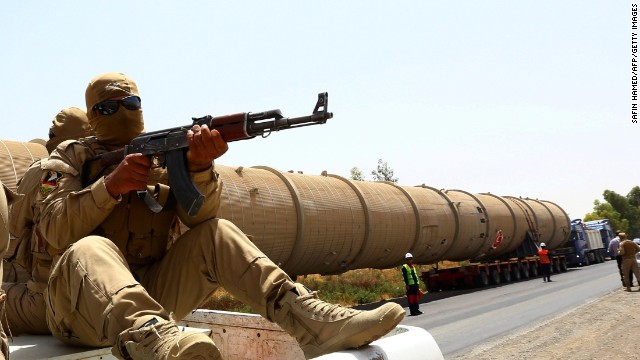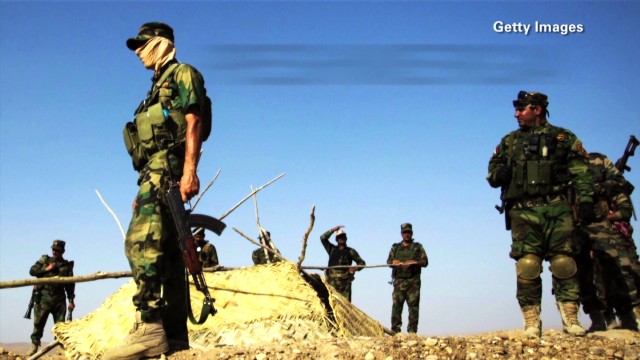Story highlights
- Terrorist group ISIS controls some oil fields in North Iraq, which helps fund its activities
- The group is using smuggling routes to get crude into nearby countries, and refine it
- The refined oil is then sold locally and used to fund ISIS' warfare and raise money
- The impact on global markets has so far been limited as ISIS is not in southern Iraq
Luay al-Khatteeb spoke to CNN about the impact of ISIS' march through northern Iraq, and the militant group's control of some oil fields. He explained how they used the oil fields to raise funds, and how it could impact global prices. This is an edited version of the conversation.
How much of Iraq's oil market do ISIS control?
ISIS control just a few marginal fields in Iraq's north, but they are enough to fund the terrorist group's self-sufficiency.
A month ago, the ISIS--controlled oil market in Iraq was reported to be worth $1 million a day. Now, with expansion, further control of oil fields and smuggling routes, the market is believed to be raising at least $2 million a day.
This could fetch them more than $730 million a year, enough to sustain the operation beyond Iraq.
ISIS have been battling over Baiji and the refinery is still under siege. However, if ISIS succeed in capturing it, the refinery would be very difficult to operate without capable and technical staff.
One important factor for the stability of global markets: ISIS is not yet in the south of Iraq, where the country's true oil bounty lies. Capturing the southern assets of the country would be mission impossible for the group.
The territory is far from fault lines, and is dominated by Shia, which makes dominating the region difficult for the Sunni militant group.
What do ISIS do with the oil they get?
ISIS smuggle the crude oil and trade it for cash and refined products, at a reduced price. They also have their own small and rudimentary refineries in Syria.
Refined oil is returned to ISIS for selling locally, in Iraq and Syria. ISIS also use the oil in their own warfare.
ISIS controls smuggling routes and the crude transported by tankers to Jordan via Anbar province, to Iran via Kurdistan, to Turkey via Mosul, to Syria's local market and to the Kurdistan region of Iraq, where most of it gets refined locally.
Turkey has turned a blind eye to this and may continue to do so until they come under pressure from the West to close down oil black markets in the country's south.
ISIS' oil will remain limited to these black markets, and the group will have no chance to establish a sophisticated pipeline network. Fixed distribution networks are complex, require investment and can become targets by the Iraqi Army and Kurdish Peshmerga.
What is ISIS' ultimate aim and how does oil wealth play into it?
At present, ISIS are trying to establish a self-sufficient state and a capital in what is known as the "Sunni triangle" (west and north Iraq), and oil production will be part of this.
They want to be self-sufficient, expand their territorial control, recruit more jihadists -- with focus on extremists with foreign passports -- and extend their operations, to eventually launch attacks on Western countries.
ISIS declared its Caliphate by turning Iraq and Syria into a hub to attract extremists. They are aiming to take over the Arabian Peninsula as their epicenter to launch attacks globally.
If this happens, they will be in control of a region that holds 60% of world's conventional energy reserves and produces 40% of global oil and gas production.
And the only way to do it is by attracting the masses of jihadists and extremists from all over the world to eventually outnumber the locals, which will endanger global security and economies.
How is ISIS' control of some of Iraq's oil fields impacting the global economy?
In the short to mid-term, the impact will be minimal as Iraq's south is its dominant producer.
However, there are enough rich assets in the midlands and the north part of Iraq that ISIS could reach out to, a potential capacity that could ramp up to a million barrels a day -- from its current 30,000 barrels a day -- should they seize control the oil-rich city of Kirkuk and its surrounding districts.
If they succeed in controlling those assets, cash inflow could stretch their empire of terrorism beyond imagination. But so far, ISIS oil trading has remained local with buyers in Jordan, Turkey, Syria and Iran via middlemen network and truck owners.
However, the instability created by Iraq effectively being broken up would have a ripple impact, in terms of hindering investment prospect in the country.
In turn, that could prevent Iraq from reaching its 2020 target of 9 million barrels of oil production per day, which is three times Iraq's current oil supply and 10% of global demand.



















